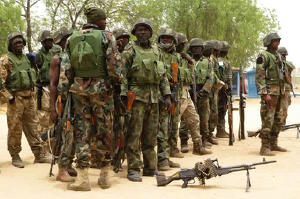I spent nearly two weeks in Maiduguri, reporting on the Nigerian army’s offensive against Boko Haram. The group has been behind many bombings and thousands of deaths in Nigeria, and Maiduguri has been its base. The group says it wants a strict form of Islamic law imposed across Nigeria.
During my time in Maiduguri I reported on public opinion on the fighting. On women and children kidnapped by Boko Haram and liberated by Nigerian forces, and the number civilian casualties. One soldier gave a powerful eyewitness account of how he saw many civilians killed.
Even though I was able to get these three reports out, I come away from the fighting against Boko Haram feeling like it’s a silent war. During our time in Maiduguri we faced restrictions on where we could go.
We faced restrictions on who we could talk to. We faced restrictions on what we could film. And we were not permitted to go to the frontline.
State of emergency
Humanitarian organisations and the media still remain restricted from going to areas where fighting between the Nigerian military and Boko Haram has been taking place – nearly three weeks since the fighting started.
As if that were not bad enough, mobile phone networks have been cut off by the authorities since the fighting started on May 15. It has meant that millions of people in the region have not been able to communicate what they’re seeing and experiencing of the war, or the impact of the state of emergency that was declared by President Goodluck Jonathan, which gave a green light for the fighting to start.
Millions of people have not been able to reach family and friends in the region. Millions of people have not been able to conduct business. Millions of people have not been able to raise the alarm, or call for help, in any kinds of circumstances.
That’s why I call the Nigerian army’s offensive against Boko Haram the silent war.
It’s not clear how long it will go on for. There have been unconfirmed reports saying the state of emergency and war against Boko Haram could last for three to six months. However, the Nigerian military has been providing daily updates of their successes fighting the group, so it may be far shorter.
The question is; what will the impact of this silent war be on the millions of people living in the northeast? Will it rid the region of Boko Haram? That’s the hope and the prayer of every Nigerian. Or will Boko Haram somehow find a way of re-grouping, and re-emerging at some date in the future? Only time will tell.
[Al-Jazeera]

